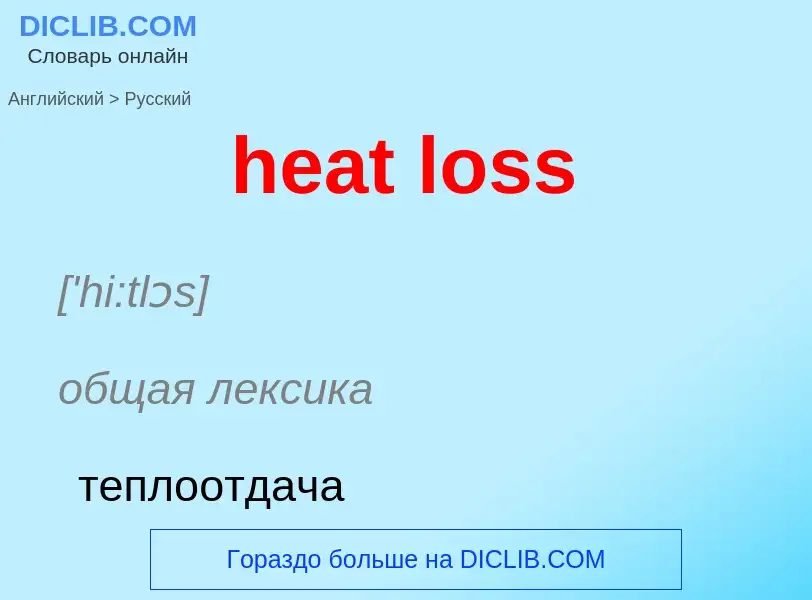Перевод и анализ слов искусственным интеллектом
На этой странице Вы можете получить подробный анализ слова или словосочетания, произведенный с помощью лучшей на сегодняшний день технологии искусственного интеллекта:
- как употребляется слово
- частота употребления
- используется оно чаще в устной или письменной речи
- варианты перевода слова
- примеры употребления (несколько фраз с переводом)
- этимология
heat loss - перевод на русский
['hi:tlɔs]
общая лексика
теплоотдача
потери тепла
потеря тепла
теплопотери
Определение
Википедия

Heat transfer is a discipline of thermal engineering that concerns the generation, use, conversion, and exchange of thermal energy (heat) between physical systems. Heat transfer is classified into various mechanisms, such as thermal conduction, thermal convection, thermal radiation, and transfer of energy by phase changes. Engineers also consider the transfer of mass of differing chemical species (mass transfer in the form of advection), either cold or hot, to achieve heat transfer. While these mechanisms have distinct characteristics, they often occur simultaneously in the same system.
Heat conduction, also called diffusion, is the direct microscopic exchanges of kinetic energy of particles (such as molecules) or quasiparticles (such as lattice waves) through the boundary between two systems. When an object is at a different temperature from another body or its surroundings, heat flows so that the body and the surroundings reach the same temperature, at which point they are in thermal equilibrium. Such spontaneous heat transfer always occurs from a region of high temperature to another region of lower temperature, as described in the second law of thermodynamics.
Heat convection occurs when the bulk flow of a fluid (gas or liquid) carries its heat through the fluid. All convective processes also move heat partly by diffusion, as well. The flow of fluid may be forced by external processes, or sometimes (in gravitational fields) by buoyancy forces caused when thermal energy expands the fluid (for example in a fire plume), thus influencing its own transfer. The latter process is often called "natural convection". The former process is often called "forced convection." In this case, the fluid is forced to flow by use of a pump, fan, or other mechanical means.
Thermal radiation occurs through a vacuum or any transparent medium (solid or fluid or gas). It is the transfer of energy by means of photons or electromagnetic waves governed by the same laws.


![A traditional air cooler in [[Mirzapur]], [[Uttar Pradesh]], [[India]] A traditional air cooler in [[Mirzapur]], [[Uttar Pradesh]], [[India]]](https://commons.wikimedia.org/wiki/Special:FilePath/Air cooler.jpg?width=200)
![An example application in climate engineering includes the creation of [[Biochar]] through the [[pyrolysis]] process. Thus, storing greenhouse gases in carbon reduces the radiative forcing capacity in the atmosphere, causing more long-wave ([[infrared]]) radiation out to Space. An example application in climate engineering includes the creation of [[Biochar]] through the [[pyrolysis]] process. Thus, storing greenhouse gases in carbon reduces the radiative forcing capacity in the atmosphere, causing more long-wave ([[infrared]]) radiation out to Space.](https://commons.wikimedia.org/wiki/Special:FilePath/Biochar.jpg?width=200)
![radiation]] intensity, from clouds, atmosphere and surface. radiation]] intensity, from clouds, atmosphere and surface.](https://commons.wikimedia.org/wiki/Special:FilePath/Erbe.gif?width=200)




